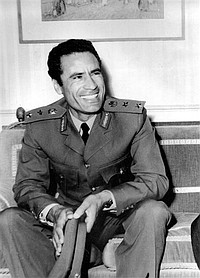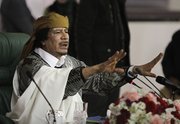BRUSSELS, Belgium — NATO unexpectedly postponed a definite decision to end its bombing campaign in Libya as consultations continued Wednesday with the United Nations and the country’s interim government over how and when to wind down the operation.
Last week, the alliance announced preliminary plans to phase out its mission Monday. NATO’s governing body, the North Atlantic Council, or NAC, was expected to formalize that decision Wednesday.
Air patrols have continued in the meantime because some alliance members were concerned that a quick end to NATO’s seven-month operation could lead to a resurgence in violence.
On Wednesday, spokesman Carmen Romero said NATO Secretary General Anders Fogh Rasmussen was consulting with the United Nations and Libya’s National Transitional Council.
“The NAC will meet with partners on Friday to discuss our Libya mission and take a formal decision,” she said, adding that there was an “ongoing process” in the U.N. Security Council.
U.S. Defense Secretary Leon Panetta said Tuesday that some of Libya’s leaders had called for NATO to continue its mission “during this interim as they try to establish some new governance.”
At the United Nations, Libya’s deputy U.N. ambassador, Ibrahim Dabbashi, asked the Security Council on Wednesday to hold up on lifting the no-fly zone and ending its authorization to protect civilians.
However, a NATO official who could not be identified under standing rules said the alliance had not received any formal request from Libya’s transitional government to prolong its air and naval patrols past the end of the month.
NATO’s 26,000 sorties, including 9,600 strike missions, have destroyed about 5,900 military targets since they started March 31. These included Libya’s air defenses and more than 1,000 tanks, vehicles and guns, as well as Moammar Gadhafi’s command-and-control networks.
The daily airstrikes enabled the rebels’ ragtag forces to advance and take Tripoli two months ago. On Sunday, Libya’s interim rulers declared the country liberated, launching the oil-rich nation on what is meant to be a two-year transition to democracy.
In Qatar, Libya’s interim leader Mustafa Abdul-Jalil attended an international planning conference Wednesday with representatives of Persian Gulf states and Western powers that participated in the Libyan operation.
The meeting is expected to focus on how the allies could help the new authorities bring stability to the nation.
Qatar, a leading Arab backer of the uprising to topple Gadhafi’s regime, contributed warplanes to the NATO-ledair campaign and helped arrange a critical oil sale to fund the former rebels.
The United Arab Emirates, Jordan and Sweden also joined in the NATO effort.
Meanwhile, a Niger presidential adviser said late Wednesday that Gadhafi’s intelligence chief, who is wanted by the International Criminal Court, has slipped into Niger and is hiding in the expanse of dunes at the Niger-Algeria border.
Abdullah al-Senoussi entered Niger several days ago in a convoy piloted by Tuaregs, the traditional desert dwellers who remained fiercely loyal to Gadhafi until the end, the adviser, who could not be named because of the sensitivity of the matter, said by telephone from Niger.
Al-Senoussi long played a key role in maintaining Gadhafi’s control in Libya. Al-Senoussi is believed to have been the mind behind the most brutal crackdowns on perceived threats to the regime.
The Niger official, an influential leader of the Tuareg community, said he is in touch with Tuaregs who are in contact with the convoy.
Al-Senoussi is one of two surviving members of the Gadhafi regime who are the subjects of international arrest warrants. The second is Gadhafi’s son and heir apparent Seif al-Islam, who the official said is also in the area but is still in the triangle of sand just north of the Niger border, between Libya and Algeria.
Information for this article was contributed by Rukmini Callimachi and Ben Hubbard of The Associated Press.
Front Section, Pages 2 on 10/27/2011

